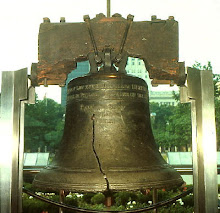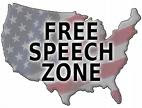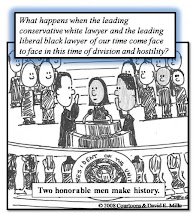
A federal appeals court in Virginia has thrown out a $5 million verdict against protesters who carried signs with inflammatory messages outside the funeral of a Marine killed in Iraq.
A three-judge panel of the United States Court of Appeals for the Fourth Circuit ruled that the protesters’ speech was protected by the First Amendment.
A Baltimore jury had awarded the Marine’s father, Albert Snyder, damages for emotional distress and invasion of privacy.
The 2006 funeral of Mr. Snyder’s son, Matthew, was among many military funerals that have been picketed by members of Westboro Baptist Church.
Protesters carried signs with messages like “Thank God for Dead Soldiers.” But they were blocks away, and as offensive as they were and are, and continue to be, we must always be reminded that the first amendment IS for those who offend us.
Repugnant, outrageous, despicable, do not adequately describe what I feel they do to these families," said Representative Steve Buyer, an Indiana Republican who is a co-sponsor of a Congressional bill to regulate demonstrations at federal cemeteries. "They have a right to freedom of speech. But someone also has a right to bury a loved one in peace." Of course it is outrageous and despicable, callous and unfair to the grieving.
A three-judge panel of the United States Court of Appeals for the Fourth Circuit ruled that the protesters’ speech was protected by the First Amendment.
A Baltimore jury had awarded the Marine’s father, Albert Snyder, damages for emotional distress and invasion of privacy.
The 2006 funeral of Mr. Snyder’s son, Matthew, was among many military funerals that have been picketed by members of Westboro Baptist Church.
Protesters carried signs with messages like “Thank God for Dead Soldiers.” But they were blocks away, and as offensive as they were and are, and continue to be, we must always be reminded that the first amendment IS for those who offend us.
Repugnant, outrageous, despicable, do not adequately describe what I feel they do to these families," said Representative Steve Buyer, an Indiana Republican who is a co-sponsor of a Congressional bill to regulate demonstrations at federal cemeteries. "They have a right to freedom of speech. But someone also has a right to bury a loved one in peace." Of course it is outrageous and despicable, callous and unfair to the grieving.
Here is a NY Times feature on how states respond to the protests:
In the past few months, nine states, including Oklahoma, Wisconsin and Indiana, have approved laws that restrict demonstrations at a funeral or burial. In addition, 23 state legislatures are getting ready to vote on similar bills, and Congress, which has received thousands of e-mail messages on the issue, expects to take up legislation in May dealing with demonstrations at federal cemeteries.
"I haven't seen something like this," said David L. Hudson Jr., research attorney for the First Amendment Center, referring to the number of state legislatures reacting to the protests. "It's just amazing. It's an emotional issue and not something that is going to get a lot of political opposition."
Most of the state bills and laws have been worded carefully to try to avoid concerns over the First Amendment, which guarantees freedom of speech. The laws typically seek to keep demonstrators at a funeral or cemetery 100 to 500 feet from the entrance, depending on the state, and to limit the protests to one hour before and one hour after the funeral.
A few states, including Wisconsin, also seek to bar people from displaying "any visual image that conveys fighting words" within several hundred feet or during the hours of the funeral. The laws or bills do not try to prevent protesters from speaking out.
Constitutional experts say there is some precedent for these kinds of laws. One case in particular, which sought to keep anti-
"A funeral home seems high on the list of places where people legitimately could be or should be protected from unwanted messages," said Michael C. Dorf, a constitutional law professor at Columbia University Law School.
































Schumber's law is a fabulous idea. Gone should be the days in which anonymous cowards can libel other citizens without having to answer for it. Jack Thompson
ReplyDelete